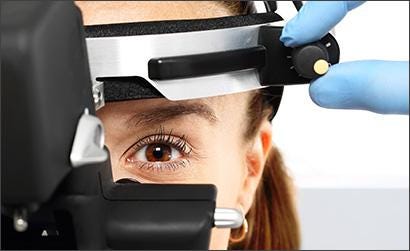The cornea is the clear dome shaped transparent, outermost layer of the eye, about 12 mm in diameter. It serves as a physical barrier against dust, microorganisms and other harmful particles. The cornea also plays an important role in vision. It filters some amount of ultraviolet light and protects iris, pupil and anterior chamber.
As light is refracted by the curvature of the cornea, it is focused on the object and forms a clear Image. Any infection, disease or trauma to the cornea can interfere with vision by blocking or distorting light as it enters the eye. It contains specialized tissue having no blood vessels and is nourished with your tears and aqueous humor (behind the cornea).
Cornea is made up of three major components.
- Epithelium — Cornea has numerous nerve endings, that’s why you experience pain while rubbing your eyes. It absorbs oxygen and nutrients from the tears. Epithelium is connected with stroma with the help of basement membrane.
- Stroma — The stroma is the thickest part of the cornea and is made up of collagen and water. Collagen fives elasticity and keeps cornea firm. These collagen fibres are arranged in strictly in a regular, geometric fashion. This arrangement is responsible for clear cornea, while in case of trauma, collagen fibres laid down in repair, often leads to cloudy cornea. Below stroma is the Descemet’s membrane, which connects it with endothelium.
- Endothelium — The innermost layer of the cornea is made up of endothelium. Function of endothelium is to maintain fluid balance by acting as a pump, expelling excess water as it is absorbed into the stroma. Without this specialized function, the stroma could become waterlogged and hazy and opaque in appearance, also reducing vision.
Symptoms of corneal conditions
Minor injuries of cornea heal by itself while major injuries may result in scarring and impaired vision.
- Intense pain.
- Blurred vision.
- Double vision
- Tearing.
- Redness.
- Extreme sensitivity to light.
Corneal conditions
- Injuries/Trauma
- Eye allergies
- Keratitis.
- Ocular herpes
- Herpes zoster (shingles)
- Dry eye.
- Nutritional Deficiencies like Vitamin A
- Corneal dystrophies — Keratoconus, Map-dot-fingerprint dystrophy, Fuch’s dystrophy
- Common diseases that can affect the cornea — Abnormal growths, autoimmune diseases, Stevens — Johnson syndrome, iridocorneal endothelial syndrome and pterygium.
Treatment
Simple corneal conditions can be treated with antibiotic or anti-inflammatory eye drops or pills. If you have advanced corneal disease, you may need an advanced treatment.
Laser treatment — In Corneal dystrophies, doctors can use a type of laser treatment called phototherapeutic keratectomy (PTK) to reshape the cornea, remove scar tissue, and make vision clearer.
Corneal transplant surgery — In case cornea is damaged and cannot be repaired, doctors can remove the damaged part and replace it with healthy corneal tissue from a donor.
Artificial cornea — As an alternative to corneal transplant, doctors can replace a damaged cornea with an artificial cornea, called a keratoprosthesis (KPro).

About Cornea
Our fully equipped cornea clinic caters to all corneal disorders like corneal infections, corneal dystrophies, corneal scars and corneal decompensation. We perform all types of Corneal transplant surgery such as
- Full thickness corneal transplant surgery or penetrating keratoplasty
- Anterior lamellar keratoplasty or DALK
- Posterior lamellar keratoplasty or DSEK/ DMEK
For those who are not suitable for cornea transplantation or high risk for Corneal transplant surgery, we now have option of Keratoprosthesis. A Keratoprosthesis is nothing but artificial cornea.

Ocular surface and dry eye clinic
Dry eye and an ocular surface clinic is a special clinic that deals with all types of ocular surface problems such as Dry eye, ocular surface squamous neoplasms, cicatricial conjunctivitis, ocular allergies, chemical injuries, Stevens Johnson syndrome, Peripheral Ulcerative Keratitis and Ocular Cicatrical Phemphigoid (OCP). Along with treatment of dry eye with drops, we also perform punctual cautery or punctual plugs. Ocular surface reconstructive procedures such as Amniotic Membrane Grafts (AMG), Mucous Membrane Grafts (MMG), pannus resection is performed at the clinic. For patients with dry eyes and Stevens-Johnson Syndrome, we have an option of Scleral Contact Lens.

Keratoconus
It’s a common corneal condition that is characterized by the forward bulging of the cornea that is progressive and leads to thinning of the cornea. The condition leads to visual distortion and poor vision due to high astigmatism (cylinder power). After one stage patient can no longer have good vision with glasses and may require contact lenses. At Mumbai Eye Care, Cornea and Lasik Centre we have various contact lens options for Keratoconus patients in the form of RGP lenses, Rose K lenses, Mini Scleral and Scleral lenses. Along with the correction of vision with contact lenses, we also have now treatment in the form of Collagen Crosslinking (UVX/C3R/CXL). This procedure arrests the progress of keratoconus and also helps in marginally decreasing corneal astigmatism. We also offer corrective surgeries such as INTACTS and PRK with CXL to our patients.

Paediatric cornea clinic
Children are not mini-adults. Almost 20% of the blindness in children in India is due to corneal problems. Most common ones are congenital (from birth) corneal opacities, congenital hereditary endothelial dystrophy, corneal infections, trauma and nutritional deficiency associated corneal problems. If not treated timely using the appropriate surgical procedure, they can lead to amblyopia (lazy eyes) and irreversible vision loss. Mumbai Eye Care, Cornea and Lasik Centre is equipped with general anesthesia services. We offer various surgical options for children with corneal problems such penetrating keratoplasty/ full thickness cornea transplant, partial thickness cornea transplant/ lamellar keratoplasties such as Deep Anterior Lamellar Keratoplasty and Descemet’s stripping endothelial keratoplasty, rotational autokeratoplasty and keratoprosthesis. Dr. Ashar has a keen interest in pediatric cornea and has numerous publications and presentations and has won awards for his work on the challenging partial thickness corneal transplant in children.

Ocular aesthetic and pterygium clinic
At Mumbai Eye Care, Cornea and Lasik Centre, work is not just about providing that perfect vision that you deserve; but to aesthetically correct your eyes. We treat surgically small ocular surface nevi/ moles, remove the pannus or scars following chemical/ thermal burns, and remove the unsightly pterygium. The unique feature of our pterygium clinic is that the surgery is that we do not use any sutures after the surgery for the application of the conjunctival/ amniotic membrane. We use the latest technique of performing surgery with fibrin glue.

Ocular immunology and uveitis clinic
At our immunology and uveitis clinic, we treat patients with ocular inflammation and anterior uveitis. These patients are thoroughly evaluated in conjunction with a physician for the need for immunosuppression and accordingly to the underlying cause patient are given treatment.
Call Now: +91 8451045934 / +91 8451045935
Visit: www.mumbaieyecare.com,
Visit: www.mumbaieyecarecornealasik.com,
You can also search for:
Cataract surgery in ghatkopar,
Eye specialist in ghatkopar rajawadi,
Eye specialist in ghatkopar east,
Cataract treatment in ghatkopar,
Lasik surgery in ghatkopar,
Lasik eye surgery in ghatkopar,
Child eye clinic in ghatkopar,
Pediatric eye care clinic in ghatkopar,
Cornea surgery in ghatkopar,
Dry eye treatment in ghatkopar,
Keratoconus treatment in ghatkopar,
Glaucoma treatment in ghatkopar,
Contact lens clinic in ghatkopar,
Eye specialist in ghatkopar,
Cornea surgery in Mumbai,
Cornea specialist in Mumbai,
Best eye specialist in ghatkopar,
Eye clinic in ghatkopar,
Eye clinic in ghatkopar west,
Eye clinic in ghatkopar east,
Eye care ghatkopar east,
Eye specialist in ghatkopar west,

0 comments:
Post a Comment